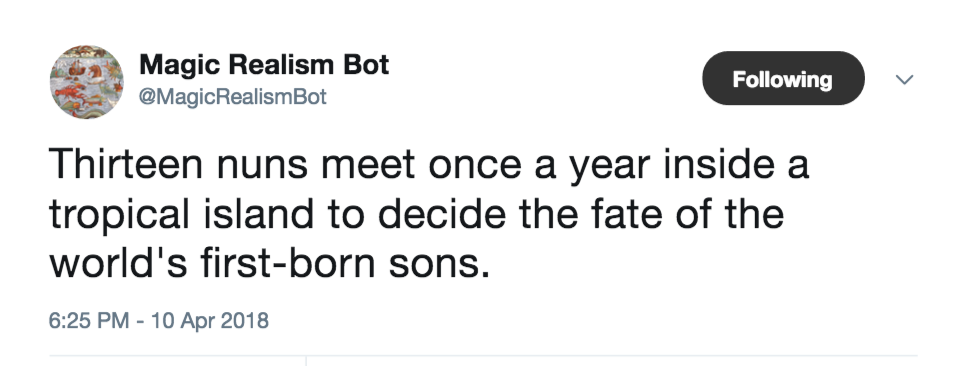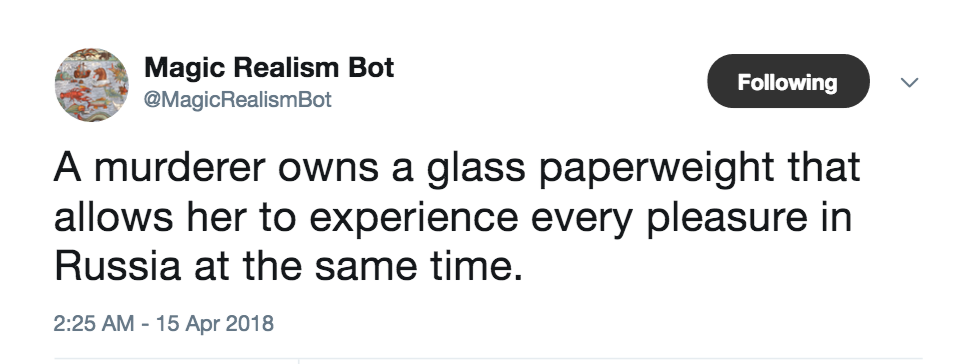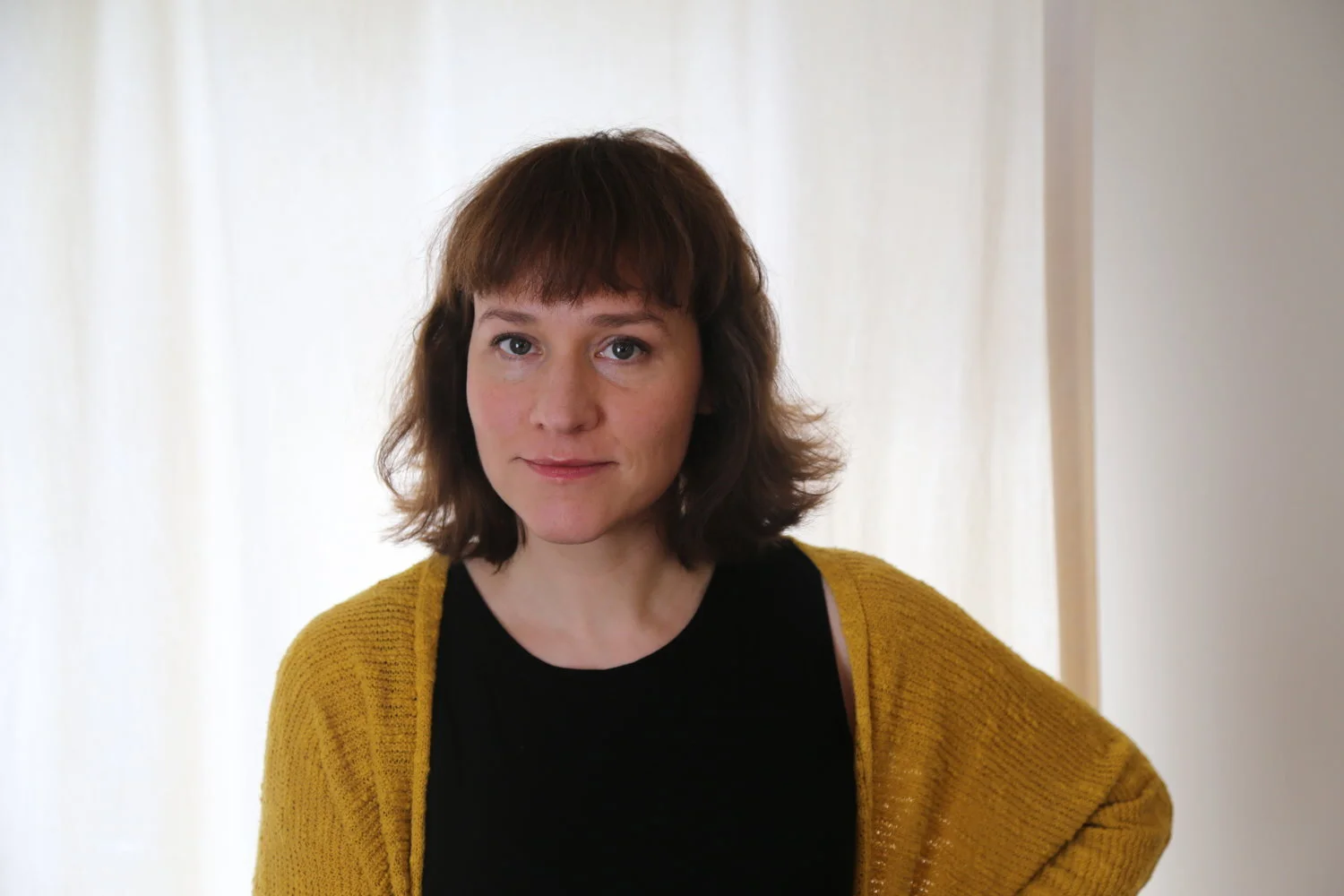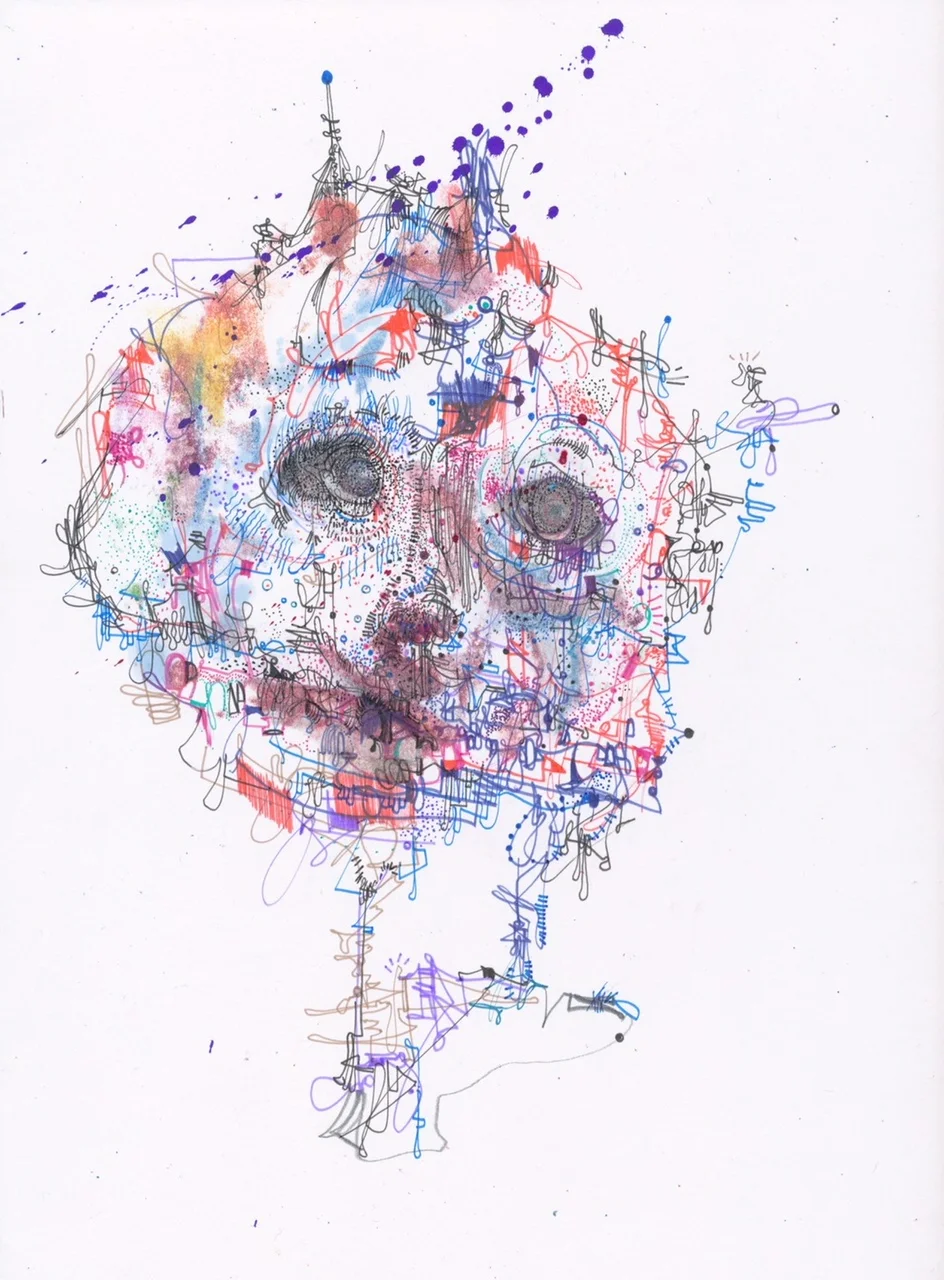Chris Rodley would have serious trouble keeping his résumé to just one page. On top of working towards his PhD at the University of Sydney, Chris has created various art installations, published numerous essays, and crafted a bounty or deep learning applications. Like MagicRealismBot, the Twitter bot that churns out micro plots of fables that pay homage/mimic Borges and Rushdie. Another example is Betty, an interactive bot reminiscent of ELIZA from the 1960s (the first of its kind). Or how about dinosaur art mixed with flowers and fruit? Rodley's output is prolific and his website is a great place to start tracking down these various projects. As I learned more and more about his creative endeavors, I decided to ask him a few questions about tech, magic, and tiptoeing (see also: moonwalking) the line between the two.








I'm by no means up to speed with Twitter bots and deep learning algorithms, but you seem to be more than proficient. Has tech always been a fascination with you?
Yes but mostly no.
Most of my time on Earth has been spent struggling to be an old-fashioned kind of writer. The traditional Romantic stereotype who is deeply passionate and original and serious about their art. Who pens their masterpieces until the small hours of the morning in their little garret—perhaps looking out over the rooftops of some picturesque European town—and is glamorously poor and prone to dying of consumption. And all that baloney. That kind of writing doesn't require much tech. In fact, if you subscribe to that overly romanticised model of writing you’re tempted to use a mechanical typewriter or a Moleskine notebook, because that’s what Hemingway or Kafka allegedly did.
I decided I wanted to be that kind of writer around age 15. Actually it was a very specific kind of writer. I was enchanted by modernist lit, gulping down Woolf, Eliot, Brecht, and so on. I wanted to emulate that exploratory, innovative literary author—represented par excellence by Joyce of course. I got heavily into experimental writing, messing with the fundamental conventions of coherence, linear narrative, playing with genres. “Make it new!”, the famous modernist call to action, was my personal motto.
But the problem with this is that it’s very hard to make things new after Finnegans Wake or Ionesco’s Bald Soprano. Modernism has run its course, and postmodernism ran its course, and somehow we ended up in the present situation where most books and plays are sort of drearily naturalistic, racy noir, or cutesy-pie magical. Poems can be as experimental as you like but for this very reason they’re often kind of predictable (conceptual poetry excluded, but that was a fad).
Eventually I realised that there is a place to be experimental as a writer, but it looks nothing like modernist fiction: that is, messing around with tech, either using platforms that other people have made (Twitter, Tumblr, BuzzFeed) in an unexpected way; or making your own bots/generators/interfaces.
And oddly enough, I’d been kind of interested in writing and tech all along, tinkering with all kinds of multimedia projects since childhood. I just didn’t recognise it as a valid career choice!
PS Traditional writing does, of course, still use technology: the computer, the typewriter, the pen, going right back to scratching into stone, wood or wax. (Incidentally, ancient Greek wax tablets looked rather like Apple's 2001 PowerBook at least from the side!)
via EIGTBOK
When did you begin combining AI with art?
Initially I used a free, openly accessible platform - deepart.io, run by the three guys from the University of Tübingen who developed the style transfer algorithm. My contribution wasn’t technical; it was just lots of goofing around at first as I tried to recreate an interesting effect I’d seen on Reddit. I never did recreate that effect [it’s reproduced on my website under "Deep Dino"] but I discovered other stuff instead!
Since then I’ve teamed up with two mates to start an AI business, which obviously means getting to know this tech under the hood too.
Platforms (by which I mean interfaces that let you dive in and mess with deep learning without any code) are both a blessing and a curse, I think. On the one hand they allow you to create the effect you want fast, no muss no fuss. On the other hand, they often lock down the user choices, funnelling about a billion people into making the same kinds of selfies.
If you ever own a robot, will you have it be a painter?
Yes! Although it probably will be an artist rather than a painter, specifically. It’s exquisitely hard to paint interesting pictures in the 21st century, I think. Over 100 years have passed since Kandinsky’s Composition VII, Malevich’s Black Square. How much further can you expand the formal, stylistic possibilities of paint and canvas beyond that (as opposed to merely doing a pleasant iteration of an existing style). The 20th century came up with some good ideas—surrealism, photorealism, pop art, op art, text art and so on—but it would seem very hard to paint something astoundingly new, in the way Courbet’s realism shocked the Academy. That makes it an interesting challenge for a robot, of course, but the results so far—see Facebook’s AI experiments, for example—suggest there’s a ways to go.
And there are so many interesting things for robots to make digital artworks from—sounds, images, spatial patterns, online data, kinesthetics, their personal knowledge about us as individuals—and I think a combination of these is more promising than emulating painting.
One of the grand challenges set out in AI’s “manifesto” in 1955 was finding out how to teach computers to be creative, a process that tends to integrate random stimuli.
From writing about memes to parkour to compiling Buzzfeed lists, you're rather prolific with the pen. Are you always jotting something down?
Yes! In about 10 different applications, usually. I’m also increasingly (like everyone) taking screenshots of content, usually if it’s visual but sometimes just as a quick way of recording the quote, context, URL etc. I wish there was a way of retrospectively filing and tagging everything though; I reckon about 99% of my notes end up being forgotten completely.
What's the rest of the year looking like for you?
Finishing my super late PhD and starting an AI studio, a little creative lab, with two collaborators here in Australia.
What's the origin behind Magic Realism Bot? Does it still need updates or does it just run on its own? I must say it's one of my very favorite Twitter accounts.
It’s nice of you to say that! It desperately needs an update, to be honest. I’ve accumulated lots of ideas for its V2.0. I also have some new artwork for its avi, done by a stupendously talented illustrator I met in a bar in Silverlake. Stand by! (I’ve been saying that for a while, though).
You're working on your PhD at the University of Sydney, yes? Can you speak on that for a bit?
I recently shifted the focus so I could look squarely at the impact of AI and bots on art. This is exciting, obviously, because we're simultaneously working on creative projects in this area.
Outside of your own work, what have you been enjoying recently? (movies, books, other artists? Do you have any advice for artists/creatives/techies working on their craft?
Recently: historical pop-up books, from Renaissance volvelles to Lothar Meggendorfer; silhouette animation pioneer Lotte Reiniger; Edge.org, which asks a question of top scientists and other estimable folks every year. This year’s compilation page of answers is one of the greatest things on the Internet at the moment.
Not so much advice, but an important lesson I’ve learnt that may or may not apply to others. I spent far too much time preoccupied with the external features of a creative career I aspired to. The glittery outer vestments, rather than the substance. I don’t just mean the accoutrements I mentioned above that appealed to me as a starry-eyed adolescent—like using a Moleskine and having a grandiloquent pen name and purchasing antiquarian editions of Homer (18th century editions in abysmal condition, mostly, so just a few bucks each) as if I was Byron or Keats. Not just this “cargo cult artist” stuff, as I said above, but the central act of what I was creating—the media, genre, style, subject matter—was all modelled closely on moth-eaten stereotypes. They didn’t really inspire me very much, but I was preoccupied with fitting this traditional model of what a writer should, that is associated with a tremendous amount of prestige and (at least) symbolic power, and anyway there didn’t seem to be any other option if you wanted to be a writer beyond writing novels or plays or poems. I was wrong! In other words, I discovered that “art” is a very different pursuit from “Art”.

































